初中英语介词的用法总结复习过程
- 格式:doc
- 大小:29.50 KB
- 文档页数:4
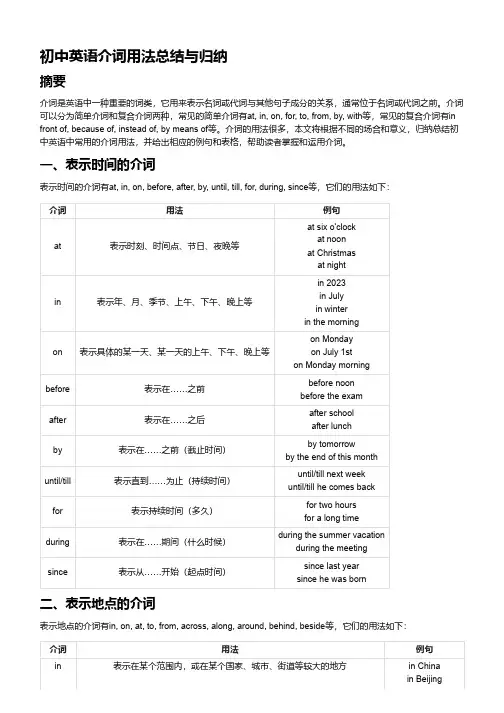
初中英语介词用法总结与归纳摘要介词是英语中一种重要的词类,它用来表示名词或代词与其他句子成分的关系,通常位于名词或代词之前。
介词可以分为简单介词和复合介词两种,常见的简单介词有at, in, on, for, to, from, by, with等,常见的复合介词有in front of, because of, instead of, by means of等。
介词的用法很多,本文将根据不同的场合和意义,归纳总结初中英语中常用的介词用法,并给出相应的例句和表格,帮助读者掌握和运用介词。
一、表示时间的介词表示时间的介词有at, in, on, before, after, by, until, till, for, during, since等,它们的用法如下:介词用法例句at表示时刻、时间点、节日、夜晚等at six o'clock at noonat Christmas at nightin表示年、月、季节、上午、下午、晚上等in 2023in Julyin winterin the morningon表示具体的某一天、某一天的上午、下午、晚上等on Mondayon July 1ston Monday morningbefore表示在……之前before noon before the examafter表示在……之后after school after lunchby表示在……之前(截止时间)by tomorrowby the end of this monthuntil/till表示直到……为止(持续时间)until/till next week until/till he comes backfor表示持续时间(多久)for two hours for a long timeduring表示在……期间(什么时候)during the summer vacation during the meetingsince表示从……开始(起点时间)since last year since he was born二、表示地点的介词表示地点的介词有in, on, at, to, from, across, along, around, behind, beside等,它们的用法如下:介词用法例句in表示在某个范围内,或在某个国家、城市、街道等较大的地方in Chinain Beijing介词用法例句in ZhongshanRoadon表示在某个表面上,或在某个楼层、台阶等较小的地方,或在某个方位上on the wall on the secondflooron the left/rightat 表示在某个具体的位置或地点,或在某个机构、场所等较小的地方,或表示靠近、附近等at the cornerat schoolat the bus stopto表示朝向某个方向或地点,或表示到达某个地点(范围之外)to the east to Japan to schoolfrom表示从某个地点出发或离开(范围之外)from home from Shanghai from Chinaacross表示横穿或穿过(从一边到另一边)across the street across the riveralong表示沿着或顺着(在一边)along the road along the riveraround表示围绕或环绕(在四周)around the lake around the worldbehind表示在……后面behind the door behind himbeside表示在……旁边beside the window beside her三、表示方向的介词表示方向的介词有to, from, into, out of, onto, off, up, down, through等,它们的用法如下:介词用法例句to表示朝向某个方向或地点,或表示目的地He is going to Beijing. She gave the book to me.from表示从某个方向或地点出发或离开,或表示来源He came from the south. This is a gift from my friend.into表示进入某个范围或空间(由外到内)He jumped into the water. She put the flowers into the vase.out of表示离开某个范围或空间(由内到外)He ran out of the room. She took the book out of the bag.onto表示移动到某个表面上(由低到高)He climbed onto the roof. She threw the ball onto the ground.off表示从某个表面上移开(由高到低)He fell off the bike. She took off her hat.up表示向上移动(由低到高)He went up the hill.介词用法例句She climbed up the ladder.down表示向下移动(由高到低)He came down the stairs. She slid down the slide.through表示穿过某个空间或物体(从一端到另一端)He walked through the forest. She looked through the window.四、表示方式、手段、工具的介词表示方式、手段、工具的介词有by, with, in, on等,它们的用法如下:介词用法例句by 表示交通工具、方式、方法等,或表示被动语态的动作执行者,或表示时间的截止点,或表示计量单位等by busby mistakeby himby tomorrowby weightwith 表示使用某种工具、器具、材料等,或表示伴随的人或物,或表示具有某种特征、状态等,或表示原因、理由等with a knifewith hisparentswith long hairwith joyin 表示使用某种语言、文字、颜色等,或表示穿着某种衣服,或表示处于某种状态、情况等,或表示在某种范围内等in Englishin black andwhitein a red dressin a hurryin generalon 表示使用某种电子设备、媒体等,或表示依靠某种力量、条件等,或表示以某种方式等,或表示参与某种活动等on TVon footon fireon dutyon holiday五、表示原因、目的、结果的介词表示原因、目的、结果的介词有for, at, from, of, with, by, because of, owing to, thanks to, out of, through等,它们的用法如下:介词用法例句for 表示原因、理由,常与sorry, famous, punish, praise, thank, blame等连用,也表示目的、意图,常与hope, wish, wait, look, come, go等连用,也可以表示用途、功能等for peacefor helpfor a walkfor funfor cutting paperat表示目的、意图,常与surprised, shocked, amazed, good, bad等连用,也可以表示针对、针对性等at his words at the news at math介词用法例句at solvingproblemsfrom 表示结果、效果,常与different, far, free, safe等连用,也可以表示来源、出发点等from the picturefrom now onfrom dangerfrom birthof 表示原因、理由,常与afraid, proud, sure, tired等连用,也可以表示所属、属性、特征等of the darkof himof the resultof his workwith 表示原因、理由,常与pleased, satisfied, angry, happy等连用,也可以表示伴随、方式、工具等with the answerwith himwith a smilewith a knifeby 表示方式、方法、手段等,也可以表示被动语态的动作执行者,或表示时间的截止点,或表示计量单位等by doing thisby himby tomorrowby weightbecauseof 表示原因、理由,相当于一个从句,后面接名词或代词等because of therainbecause of thatowing to表示原因、理由,相当于一个从句,后面接名词或代词等owing to the trafficjamowing to hisillnessthanks to表示原因、理由,含有感激或讽刺的意味,后面接名词或代词等thanks to yourhelp thanks to his carelessnessout of表示原因、理由,含有出于某种动机或感情的意味,后面接名词或代词等out of curiosity out of pitythrough表示原因、理由,含有经过某种过程或方式的意味,后面接名词或代词等through hard work through a window六、表示对象、范围的介词表示对象、范围的介词有of, for, about, with, to, from, among, between等,它们的用法如下:介词用法例句of表示所属、属性、特征等,也可以表示分离、脱离等the color of the skya cup of teaa friend of mineget rid of itfor表示目标、对象、受益者等,也可以表示目的、原因等 a gift for youa seat for twoa doctor for the poora room for rentabout表示主题、内容、话题等,也可以表示大约、左右等a book about history tell me about yourself about ten minuteswith表示伴随、陪同等,也可以表示方式、工具等stay with mea man with glasses speak with a loud voice cut it with a knifeto表示方向、目的地等,也可以表示对象、接受者等go to school fly to London say hello to him give it to herfrom表示来源、出发点等,也可以表示对象、对比者等come from Chinaa letter from my father different from youlearn from himamong表示在三个或三个以上的人或物之间(内部)share it among yourselves a flower among the grassbetween表示在两个人或物之间(内部或外部)sit between thema river between two mountains七、其他常用的介词除了上述介词外,还有一些其他常用的介词,如as, like, except, without, beyond, above, below, over, under等,它们的用法如下:介词用法例句as表示身份、职业、角色等,也可以表示方式、方法、程度等as a teacher as usual as you know as well aslike表示相似、类似等,也可以表示喜欢、喜爱等like a birdlike father, like sonI like music.except表示除……之外(不包括)everyone except me every day except Sundaywithout表示没有、缺少等without money without water without a wordbeyond表示超出、超过等beyond the wall beyond my expectation beyond controlabove表示在……之上(不接触)above the ground above sea levelabove allbelow表示在……之下(不接触)below the surface below zero below averageover表示在……之上(覆盖或接触)over the bridge over his head over the phoneunder表示在……之下(覆盖或接触)under the tree under his arm under the weather。
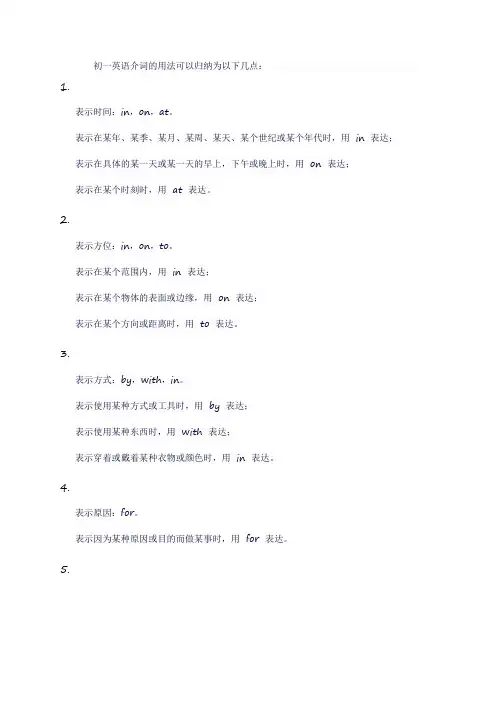
初一英语介词的用法可以归纳为以下几点:
1.
表示时间:in,on,at。
表示在某年、某季、某月、某周、某天、某个世纪或某个年代时,用in 表达;
表示在具体的某一天或某一天的早上,下午或晚上时,用on 表达;
表示在某个时刻时,用at 表达。
2.
表示方位:in,on,to。
表示在某个范围内,用in 表达;
表示在某个物体的表面或边缘,用on 表达;
表示在某个方向或距离时,用to 表达。
3.
表示方式:by,with,in。
表示使用某种方式或工具时,用by 表达;
表示使用某种东西时,用with 表达;
表示穿着或戴着某种衣物或颜色时,用in 表达。
4.
表示原因:for。
表示因为某种原因或目的而做某事时,用for 表达。
5.
表示除了:except,besides。
表示从整体中除去某部分时,用except 表达;
表示除了某人或某物外还有其他的时,用besides 表达。
以上是初一英语介词的用法归纳,需要强调的是,介词的用法是多样的,具体使用需要根据语境和上下文来判断。
因此,在学习介词时需要多加练习和运用。

初中英语知识点归纳介词的用法介词是连接词与词之间,短语与短语之间,在句中表示方向、关系、时间、原因等意义的词语。
在英语中,介词的用法非常丰富多样,掌握好介词的用法,对于学习英语有着重要的意义。
下面将对初中英语中常见的介词用法进行归纳介绍。
一、表示方向、位置和距离的介词1. 在(in):在某个地方或物体内部2. 在(on):在某个平面或表面上3. 在(at):在某个地点4. 在(over):位于之上,不接触5. 在(under):位于之下,不接触6. 在(between):在两个事物之间7. 在(behind):在某物之后8. 在(in front of):在某物之前9. 在(near):在附近10. 在(around):在周围二、表示时间的介词1. 在(at):在某个具体时间点2. 在(in):在某个时间段3. 在(on):在某个具体日期三、表示原因的介词1. 因为(of):表示原因、缘故2. 由于(because of):表示原因、由于四、表示目的、用途和方式的介词1. 为了(in order to):表示目的2. 以便(in order that):表示目的3. 用(with):表示使用的手段或工具4. 通过(by):表示方式、方法5. 以(for):表示目的五、表示比较的介词1. 比较起见(than):表示比较的对象2. 和(with):与某人或某物在一起六、其它常见的介词1. 关于(about):表示涉及某一话题2. 靠(by):表示接近某人或某物3. 经过(through):表示通过某地或某事4. 编写(at):表示在某地工作或活动5. 因(as):表示角色、身份6. 例如(for example):表示举例7. 包括(including):表示包含某物以上是初中英语中常见的介词用法的归纳总结。
熟练掌握这些介词的用法,对于构建正确的句子和语法结构非常重要。
希望能对你的学习有所帮助。

初学英语介词方法总结第1篇第一,英语学习要从简易入手。
如果从一开始就抱着大部头不放,只会降低学习的热情,收获甚少。
所以,要循序渐进,从简单着手。
可以先看难度低的读物,培养兴趣和语感,并熟练运用,逐渐增加难度,由浅入深。
第二,大量联系泛读和泛听。
如果想要促成质的进步,就必须有量的提高。
平时要大量看英文杂志、听英语广播和看原版电影,但切记咬文嚼字,重点是内容主题,让自己能看、听和读进去。
第三,不断重复加以巩固。
在学英语的过程中,一定要不断重复听书读写的内容,只有这样才能把学到的东西变成自己的知识,才会熟练地运用。
在重复的过程,也是在提炼精度的过程。
第四,先模仿后应用。
作为英语学习者,必须模仿已有的东西,不经历到位的模仿的“创新”意味着错误。
创新源于模仿,模仿是学习英语的.基础,模仿是创新的基础。
只有在你通过模仿,真正掌握了英语的灵魂、精髓,然后,才可能谈到自己的语言风格。
第五,分部强化练习。
分别对听力、阅读、写作、口语四部分进行突击训练,在一段时间内进行强化练习来提高水平。
这个过程注定是枯燥乏味的,但当你把一个个突击进行到底,就会发现英语水平的稳步提高。
很多英语站上有免费英语的资源,要善于运用。
第六,发展英语学习的兴趣。
“兴趣是最好的老师”,学习英语首先要有兴趣并努力发展这一兴趣。
如果你对英语没有兴趣,那就不会有持续的干劲和动力,英语学习将很难坚持下去。
反之,一旦你对英语有了兴趣并努力地发展这一兴趣,那么,你就会不知不觉地去做,带着强烈的欲望去读英语,听英语,说英语,写英语。
你就会主动地找人去练英语,找一切可以提高你英语的机会去提高你的英语水平。
不知不觉中你的英语就会提高。
不知不觉中你就把英语学会了。
初学英语介词方法总结第2篇第一、英语单词的记忆单词是在基础不过的基础了,要想学好英语,需要具备足够的词库量,但在学单词的时候想必很多童鞋会碰到效果不佳,无法牢记的局面,而针对记单词,我个人所采取的主要方法就是联想记忆法和音节拼写法;联想记忆法:就是将事物之间的联系建立起来,一旦发现既可以链接起来,这样可以完全凭借联系性来记忆单词,方式相对比较轻松,且可实用性很强。
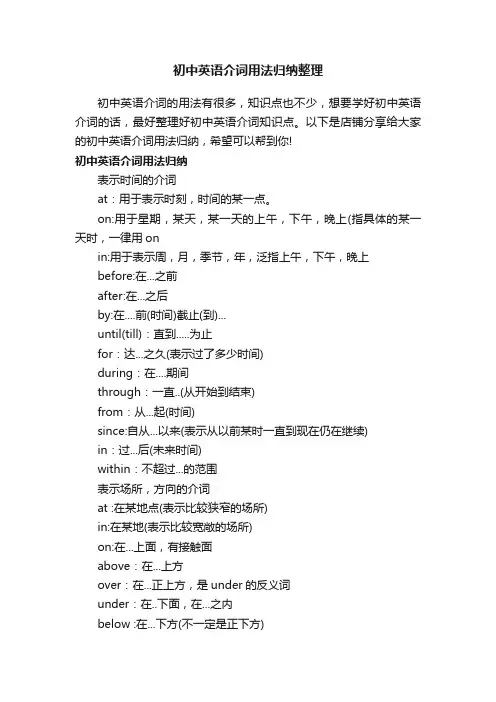
初中英语介词用法归纳整理初中英语介词的用法有很多,知识点也不少,想要学好初中英语介词的话,最好整理好初中英语介词知识点。
以下是店铺分享给大家的初中英语介词用法归纳,希望可以帮到你!初中英语介词用法归纳表示时间的介词at:用于表示时刻,时间的某一点。
on:用于星期,某天,某一天的上午,下午,晚上(指具体的某一天时,一律用onin:用于表示周,月,季节,年,泛指上午,下午,晚上before:在...之前after:在...之后by:在....前(时间)截止(到)...until(till):直到.....为止for:达...之久(表示过了多少时间)during:在....期间through:一直..(从开始到结束)from:从...起(时间)since:自从...以来(表示从以前某时一直到现在仍在继续)in:过...后(未来时间)within:不超过...的范围表示场所,方向的介词at :在某地点(表示比较狭窄的场所)in:在某地(表示比较宽敞的场所)on:在...上面,有接触面above:在...上方over:在...正上方,是under的反义词under:在..下面,在...之内below :在...下方(不一定是正下方)near:近的,不远的by:在...的旁边,比near的距离要近between:在两者之间among:在三者或者更多的之中around:环绕,在...的周围,在....的四周in front of:在...的前面behind:在...后边in:在..之内,用于表示静止的位置into:进入out of :和into一样,也表示有一定的运动方向along:沿着across:横过(平面物体)through:贯通,通过to :达到..地点(目的地)或方向for:表示目的,为了.....from:从...地点起其他介词with:和..在一起; 具有,带有; 用某种工具或方法in:表示用什么材料(例如:墨水,铅笔等)或用什么语言。
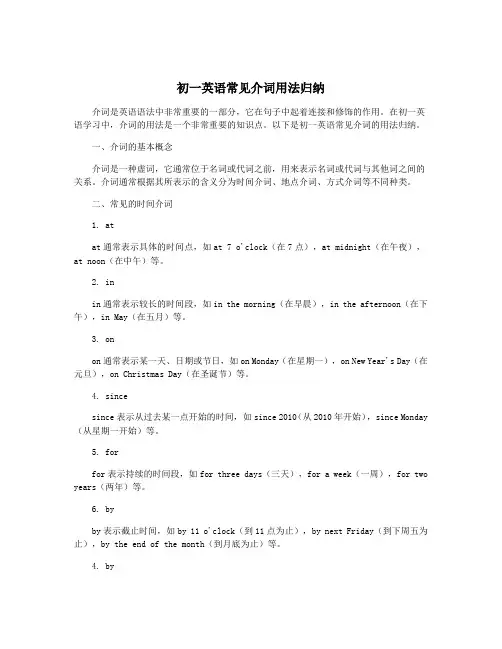
初一英语常见介词用法归纳介词是英语语法中非常重要的一部分,它在句子中起着连接和修饰的作用。
在初一英语学习中,介词的用法是一个非常重要的知识点。
以下是初一英语常见介词的用法归纳。
一、介词的基本概念介词是一种虚词,它通常位于名词或代词之前,用来表示名词或代词与其他词之间的关系。
介词通常根据其所表示的含义分为时间介词、地点介词、方式介词等不同种类。
二、常见的时间介词1. atat通常表示具体的时间点,如at 7 o'clock(在7点),at midnight(在午夜),at noon(在中午)等。
2. inin通常表示较长的时间段,如in the morning(在早晨),in the afternoon(在下午),in May(在五月)等。
3. onon通常表示某一天、日期或节日,如on Monday(在星期一),on New Year's Day(在元旦),on Christmas Day(在圣诞节)等。
4. sincesince表示从过去某一点开始的时间,如since 2010(从2010年开始),since Monday (从星期一开始)等。
5. forfor表示持续的时间段,如for three days(三天),for a week(一周),for two years(两年)等。
6. byby表示截止时间,如by 11 o'clock(到11点为止),by next Friday(到下周五为止),by the end of the month(到月底为止)等。
4. byby表示在某个位置或附近,如by the river(在河边),by the sea(在海边),by the park(在公园旁)等。
5. beside/besidesbeside表示在某个物体旁边,如beside the tree(在树旁),beside the lake(在湖边);besides表示除了……之外,如besides English, he can also speak French(除了英语,他还会说法语)。
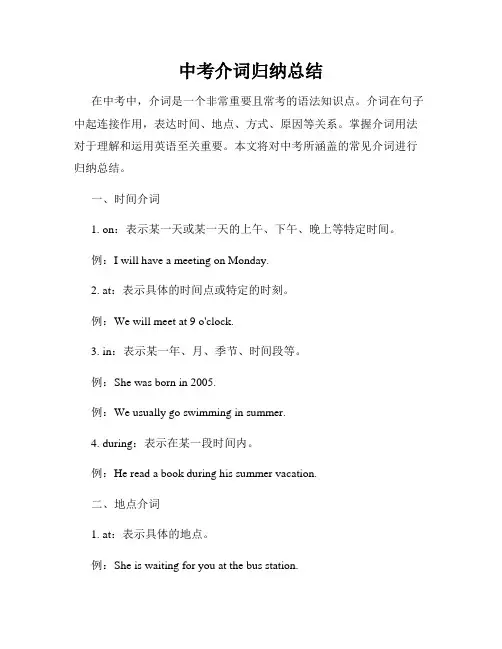
中考介词归纳总结在中考中,介词是一个非常重要且常考的语法知识点。
介词在句子中起连接作用,表达时间、地点、方式、原因等关系。
掌握介词用法对于理解和运用英语至关重要。
本文将对中考所涵盖的常见介词进行归纳总结。
一、时间介词1. on:表示某一天或某一天的上午、下午、晚上等特定时间。
例:I will have a meeting on Monday.2. at:表示具体的时间点或特定的时刻。
例:We will meet at 9 o'clock.3. in:表示某一年、月、季节、时间段等。
例:She was born in 2005.例:We usually go swimming in summer.4. during:表示在某一段时间内。
例:He read a book during his summer vacation.二、地点介词1. at:表示具体的地点。
例:She is waiting for you at the bus station.2. on:表示表面或某物之上。
例:There is a book on the table.3. in:表示在某个范围、区域、国家或大洲内。
例:We live in a small town.4. to:表示朝向、方向。
例:He went to the library.三、方式介词1. by:表示通过某种交通方式或手段。
例:I usually go to school by bus.2. with:表示伴随、陪同。
例:She walks to school with her friends.3. in:表示用某种方式或手段。
例:He communicated with her in English.四、原因介词1. for:表示目的、原因或理由。
例:He went to the store for some milk.2. because of:表示因为。
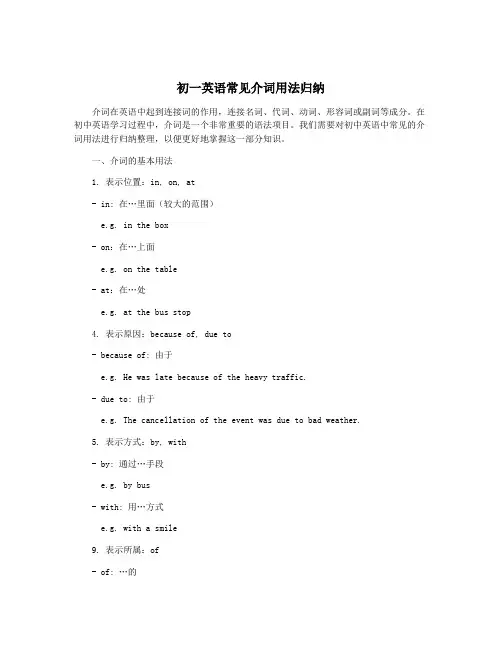
初一英语常见介词用法归纳介词在英语中起到连接词的作用,连接名词、代词、动词、形容词或副词等成分。
在初中英语学习过程中,介词是一个非常重要的语法项目。
我们需要对初中英语中常见的介词用法进行归纳整理,以便更好地掌握这一部分知识。
一、介词的基本用法1. 表示位置:in, on, at- in: 在…里面(较大的范围)e.g. in the box- on:在…上面e.g. on the table- at:在…处e.g. at the bus stop4. 表示原因:because of, due to- because of: 由于e.g. He was late because of the heavy traffic.- due to: 由于e.g. The cancellation of the event was due to bad weather.5. 表示方式:by, with- by: 通过…手段e.g. by bus- with: 用…方式e.g. with a smile9. 表示所属:of- of: …的e.g. the hat of the boy2. look forward to: 期待e.g. I am looking forward to the summer vacation.5. be interested in: 对…感兴趣e.g. Amy is interested in learning Chinese.三、常见介词错误用法及纠正1. 错误用法:depend of正确用法:depend one.g. We depend on each other.通过以上的介词错误用法及纠正,我们可以更清晰地了解该如何正确使用这些介词。
四、综合练习通过上述的综合练习,可以帮助大家更好地掌握介词用法。
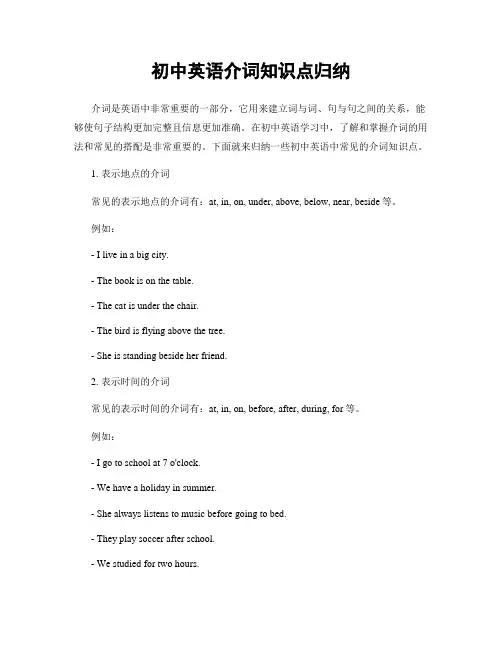
初中英语介词知识点归纳介词是英语中非常重要的一部分,它用来建立词与词、句与句之间的关系,能够使句子结构更加完整且信息更加准确。
在初中英语学习中,了解和掌握介词的用法和常见的搭配是非常重要的。
下面就来归纳一些初中英语中常见的介词知识点。
1. 表示地点的介词常见的表示地点的介词有:at, in, on, under, above, below, near, beside等。
例如:- I live in a big city.- The book is on the table.- The cat is under the chair.- The bird is flying above the tree.- She is standing beside her friend.2. 表示时间的介词常见的表示时间的介词有:at, in, on, before, after, during, for等。
例如:- I go to school at 7 o'clock.- We have a holiday in summer.- She always listens to music before going to bed.- They play soccer after school.- We studied for two hours.3. 表示原因的介词常见的表示原因的介词有:because of, due to, thanks to等。
例如:- He couldn't come because of the bad weather.- The match was canceled due to the heavy rain.- Thanks to your help, I finished my homework.4. 表示目的的介词常见的表示目的的介词有:for, to等。
例如:- He bought a gift for his mother.- She went to the supermarket to buy some food.5. 表示方式的介词常见的表示方式的介词有:by, with等。

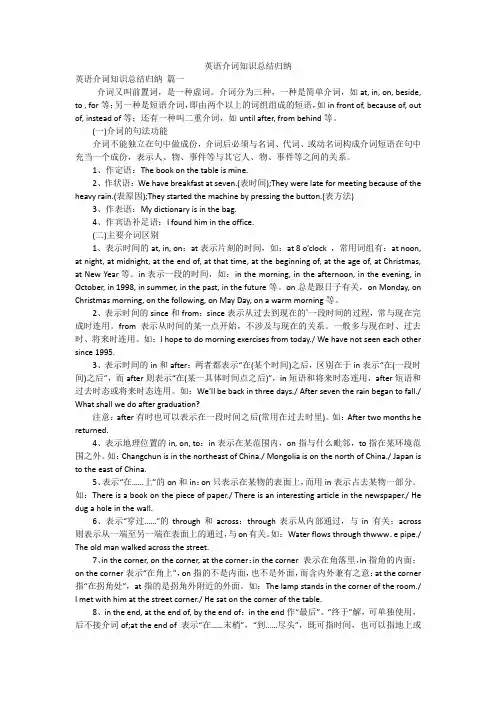
英语介词知识总结归纳英语介词知识总结归纳篇一介词又叫前置词,是一种虚词。
介词分为三种,一种是简单介词,如at, in, on, beside, to , for等;另一种是短语介词,即由两个以上的词组组成的短语,如in front of, because of, out of, instead of等;还有一种叫二重介词,如until after, from behind等。
(一)介词的句法功能介词不能独立在句中做成份,介词后必须与名词、代词、或动名词构成介词短语在句中充当一个成份,表示人、物、事件等与其它人、物、事件等之间的关系。
1、作定语:The book on the table is mine.2、作状语:We have breakfast at seven.(表时间);They were late for meeting because of the heavy rain.(表原因);They started the machine by pressing the button.(表方法)3、作表语:My dictionary is in the bag.4、作宾语补足语:I found him in the office.(二)主要介词区别1、表示时间的at, in, on:at表示片刻的时间,如:at 8 o’clock ,常用词组有:at noon, at night, at midnight, at the end of, at that time, at the beginning of, at the age of, at Christmas, at New Year等。
in表示一段的时间,如:in the morning, in the afternoon, in the evening, in October, in 1998, in summer, in the past, in the future等。
初中英语介词语法知识点总结(WORD版本试题+名师解析答案,建议下载练习)一、介词的概念概念:介词一般用于名词或代词前,表示该词与句中其他成分的关系。
I often read English in the morning. Let’s meet at school.He often plays football with them. Thank you for helping me.二、介词的分类(一) 时间介词(二) 地点介词(三) 其他介词★★ (一) 时间介词in: 泛指的早中晚;月份;年份;;in springin the twenty-first centuryon: 某天的早中晚;某天 (日期;周几);on New Year’s Day on weekends on vacationat: 具体的时刻;;at the age of 20at night / at Christmasduring: 在……期间(+时间段)She lives with us during these days. He visited his aunt during the holiday.before: 在……以前I have to go to bed before 10:00 p.m.after: 在……以后Lily often plays basketball after school.单选( )1. What do you want to do weekends?A. onB. overC. toD. in ( )2. I like swimming summer.A. onB. inC. atD. for ( )3. the age of 26, Lily became a writer.A. OnB. InC. ToD. At( )4. Jim learned to drive ___ the holiday.A. atB. duringC. toD. for( )5. He went to Shanghai July 7, 2013 and came backa cold morning last year.A. in; onB. on; inC. on; onD. in; in( )6. My mom often tells me to go back home dark(黄昏).A. afterB. toC. beforeD. for( )7. A lot of people are here _ vacation every year.A. ofB. onC. atD. with★★ (二) 地点介词1.地点介词 at, in, onat: “在……”(表一个点或小地方)at home at Mr. Cool’s Clothes Storeat the pool at Central Parkin: “在……里” (表一个范围或大地方) in China in Beijing in the water in the parkon: “在……上” (表一个表面,并接触) on the floor on the wall 对比这三个句子:They stood at the door and waited.他们站在门口等着。
初中英语知识点归纳介词短语的常见搭配与用法初中英语知识点归纳:介词短语的常见搭配与用法介词短语在英语中是非常常见且重要的语法结构之一。
掌握了介词短语的常见搭配与用法,对于学习和运用英语语言来说至关重要。
本文将归纳介绍初中英语中常见的介词短语搭配及其用法。
一、关于地点的介词短语1. in front of - 在...前面例句:The school is located in front of the park.2. at the top/bottom of - 在...的顶部/底部例句:The book you are looking for is at the top of the shelf.3. on the left/right - 在...的左边/右边例句:She lives in the house on the left.4. next to - 紧挨着,旁边例句:There is a café next to the library.5. in the middle of - 在...的中间例句:The monument stands in the middle of the park.二、关于时间的介词短语1. at (a specific time) - 在(特定时间)例句:I will meet you at 3 o'clock.2. in (a month/year/season) - 在(某个月份/年份/季节)例句:My birthday is in December.3. on (a specific day/date) - 在(特定日子/日期)例句:We usually have a family gathering on Christmas Day.4. during (a period of time) - 在(某段时间)例句:I traveled to Europe during the summer vacation.5. from...to - 从...到...例句:The museum is open from 9 a.m. to 5 p.m.三、关于方式的介词短语1. by car/bus/bike - 通过汽车/公交车/自行车例句:I usually go to work by bike.2. on foot - 步行例句:He goes to school on foot every day.3. with the help of - 在...的帮助下例句:He completed the project with the help of his teammates.4. in a hurry - 匆忙地例句:I left the house in a hurry and forgot to bring my phone.5. by myself/ourselves - 自己例句:I finished the homework by myself.四、关于目的的介词短语1. for (a purpose) - 为了(某个目的)例句:She is studying hard for the exam.2. to (a place) - 去(某个地方)例句:I am going to the supermarket to buy some groceries.3. in order to - 为了例句:He saved money in order to buy a new car.4. with the aim of - 以...为目标例句:They started the project with the aim of promoting environmental awareness.五、关于原因的介词短语1. because of - 因为例句:The match was canceled because of the heavy rain.2. due to - 因为例句:The flight was delayed due to bad weather conditions. 3. as a result of - 由于例句:As a result of his hard work, he obtained excellent results.4. thanks to - 多亏了例句:Thanks to your help, I finished the task on time.六、关于状态的介词短语1. in good/bad condition - 状况良好/不好例句:The car is in good condition after the repair.2. with the help of - 在...的帮助下例句:He fixed the broken computer with the help of his friend.3. under pressure - 在压力下例句:She always performs well under pressure.4. by accident - 偶然地例句:I found this book by accident while cleaning the attic.七、关于数量的介词短语1. a couple of - 两个,几个例句:I bought a couple of books from the bookstore.2. a few - 几个,少量例句:I have a few friends who live in this city.3. a lot of - 许多例句:There are a lot of people in the park today.4. plenty of - 充足的例句:There is plenty of food at the party, so don't worry.以上是初中英语中常见的介词短语搭配及其用法的归纳。
初中英语知识点归纳介词的分类和用法初中英语知识点归纳——介词的分类和用法介词作为英语语法中的重要组成部分,用于连接名词、代词、动词或其他句子成分。
它们在句子中起到指示位置、时间、关系等作用。
下面将对初中英语中介词的分类和用法进行归纳介绍。
一、介词的分类介词一般可以分为以下几类:1. 地点介词:用来表示位置、方向或地点关系,如in(在……之内)、on(在……之上)、at(在……处)等。
例如:- The book is on the table.(这本书在桌子上。
)2. 时间介词:用来表示时间关系,如in(在……内)、on(在……上)、at(在……时刻)、during(在……期间)等。
例如:- I usually have breakfast at 7 o'clock in the morning.(我通常在早上七点吃早餐。
)3. 方式介词:用来表示方式、方法或手段,如by(通过、用)、with(用、携带)等。
例如:- I went to school by bus.(我乘公交车去上学。
)4. 原因介词:用来表示原因、目的或理由,如for(因为、为了)、because of(因为)等。
例如:- He was absent from school because of illness.(他因为生病缺课了。
)5. 目的介词:用来表示目的、结果或效果,如for(为了)、to(为了、到……去)等。
例如:- We study hard for good grades.(我们努力学习是为了取得好成绩。
)6. 关系介词:用来表示关系、连接或起始点,如of(……的)、from(从……来)等。
例如:- The capital of China is Beijing.(中国的首都是北京。
)7. 引导介词:用来引导特定的短语或句子结构,如with(与……一起)、without(没有)等。
例如:- I can't live without my phone.(没有手机,我无法生活。
初中英语介词的知识点总结初中英语介词的知识点总结在我们平凡的学生生涯里,是不是听到知识点,就立刻清醒了?知识点也可以通俗的理解为重要的内容。
想要一份整理好的知识点吗?下面是小编为大家收集的初中英语介词的知识点总结,仅供参考,大家一起来看看吧。
初中英语介词的知识点总结篇1一、表示时间的介词时间介词有in , on,at,after,since,during,by,before,after,until等,前三个介词用法有个口诀:at午夜、点与分,上午、下午、晚用in。
年、月、年月、季节、周,之前加上介词in。
将来时态多久后,这些情形亦用in。
日子、日期、年月日,星期之前要用on。
其余几组常见的时间介词辨析如下辨析如下:1、时间介词in与after 的用法辨析介词 in + 一段时间用于一般将来时。
如:We’ll go to school in two weeks.介词after + 一段时间用于一般过去时。
如:My mother came home after half an hour.介词after + 时间点常用于一般将来时。
如:We’ll go out for a walk after supper.2、时间介词for与since的用法辨析介词for 表示一段时间如:I have been living here for 10 years.介词since 表示从过去某一时间以来如:I have been living here since 2000.3、时间介词before与by的用法辨析介词before表示“在…之前”如:He won’t come back before five .介词by表示“到…时为止,不迟于…”如:The work must be finished by Friday.4、时间介词during与for的用法辨析当所指的时间起止分明时用介词during如:He swims every day during the summer.如果一段时间不明确则用介词for如:I haven’t seen her for years.5、时间介词till与until用法的异同till和until用在肯定句中,均可表示“直到…为止”,如:I will wait till(until)seven o'clock.till和until用在否定句中,均可表示“在…以前”或“直到…才”。
初中英语知识点归纳介词的基本用法和固定搭配初中英语知识点归纳:介词的基本用法和固定搭配介词是英语语法中的重要部分,用来表示名词与其他单词之间的关系。
掌握介词的基本用法和固定搭配对于学生来说至关重要。
本文将归纳介词的基本用法和部分常见的固定搭配,以帮助读者更好地掌握初中英语。
一、介词的基本用法1. 表示地点关系:at, in, on介词at通常用于点、特定场所,如:at home(在家)、at the park (在公园);介词in通常用于大的、封闭的地方,如:in the classroom(在教室)、in London(在伦敦);介词on通常用于表面、线条以及交通工具上,如:on the table(在桌子上)、on the bus(在公交车上)。
2. 表示时间关系:at, in, on介词at通常用于具体时刻或某天的夜晚,如:at 8 o'clock(在八点钟)、at night(在晚上);介词in通常用于年、月、季节,如:in 2022(在2022年)、in April(在四月);介词on通常用于具体某一天,如:on Monday(在星期一)、on Christmas Day(在圣诞节)。
3. 表示原因和理由:for, because of介词for常与动词不定式搭配,表示目的或原因,如:apply for a job(申请工作);介词because of常与名词搭配,表示原因或引起的结果,如:because of the rain(因为下雨)。
4. 表示方式和手段:by, with介词by常与动词的进行时态搭配,表示方法或手段,如:go to work by bus(乘公交车去上班);介词with常与名词搭配,表示使用的工具或伴随状态,如:write with a pen(用钢笔写)。
5. 表示目的和结果:to, for介词to常与动词原形搭配,表示目的或移动方向,如:go to school (去学校);介词for常与名词搭配,表示目的或结果,如:a gift for you(给你的礼物)。
初中英语知识点归纳常用的介词和介词短语介词是一种连接词,位于句子中,可以表达位置、方向、时间、原因、目的等含义。
在英语学习中,熟练掌握常用的介词和介词短语是非常重要的。
本文将对初中英语中常用的介词和介词短语进行归纳总结,帮助读者更好地理解和运用。
一、位置和方向类介词1. in :表示在某个具体空间或范围内e.g. in the room(在房间里)2. on :表示在某个平面或垂直面上e.g. on the table(在桌子上)3. at :表示在某个位置或地点e.g. at the park(在公园)4. under :表示在某物体的下方e.g. under the chair(在椅子下面)5. above :表示在某物体的上方e.g. above the clouds(在云层上)6. behind :表示在某物体的后方e.g. behind the door(在门后面)7. in front of :表示在某物体的前方e.g. in front of the building(在建筑物前面)二、时间类介词1. at :表示具体的时间点e.g. at 8 o'clock(在8点钟)2. on :表示在某一天或日期e.g. on Monday(在星期一)3. in :表示在某一段时间或月份e.g. in the morning(在早上)4. after :表示在某个时间之后e.g. after school(放学后)5. before :表示在某个时间之前e.g. before dinner(晚饭前)三、原因和目的类介词1. because of :表示由于某个原因e.g. He couldn't come because of the bad weather.(因为天气不好,他不能来。
)2. thanks to :表示由于某个好事发生e.g. Thanks to his help, I passed the exam.(多亏了他的帮助,我通过了考试。
介词一、意思是“用”的几个词介词有三个:in, with, by,在句首或句末作状语。
1. in+language (English, Chinese, French, Japanese等),What’s this in English?In English, it’s an orange.2. with +具体的工具(pen, pencil, knife 等),单数名词前要加冠词。
I want to write with a pencil, and I don’t like write with a pen.Chinese people eat food with chopsticks, but western people like to eat food with knives and forks.3. by + 抽象的工具(e-mail, force, phone 等)表方式或手段,名词前不用冠词; by+ 动名词或动名词短语(通过,靠,以);by+交通工具(car, bus, bike)Send this letter by e-mail.She lives by selling fruit.My mother makes living by teaching.动词有一个:use; use sth to do sthChinese people use chopsticks to eat food.We use a knife to cut.二、in的用法1.in+月份、年份;on+日子/星期/某个不确定的具体日子in March, in 2014, in march 2014on April 1, on Monday, on a rainy day此外:in the morning/ afternoon/ evening/ night; in spring/ summer/ autumn/ winter at noon/ night/ midnightat 8 o’clock2. in+时间段(three days, a week等)在…之后,句子用将来时After+时间段(three days, a week等)在…之后,句子用过去时;after+时间点,句子用将来时My father will be back in a week.My father came back after a week.I will play basketball after school.He will be back after three o’clock.3. in +颜色+服装,意思是:穿着什么颜色的服装The girl is in a red skirt.We have green sweaters in white and red.4. in+地点,在…里面;in the east/west/south/north of 在…东、西、南、北,一地在某个地的范围内in the house; in the sky; in the eastKunming is in the north of Y unnan.三、with 的用法1 作“用”讲,见上文。
2. 做“和…”讲,常用于句末。
and 是连词,连接两个名词。
I went to the zoo with my parents last week.My parents and I went to the zoo last week.3.作“有”讲,在名词后面作后置定语。
I’d like to buy a house with a garden.The girl with long hair is very beautiful.反义词:without “没有”I’d like to go without you.The house without a garden is cheaper.She left without saying goodbye.4. “随着区别:with 是介词,with+名词+ 名词/介词短语/现在分词(称为独立主格结构)as 是连词+句子With time going by, I learn more and more knowledge.With no light outside, it felt like midnight.With a hard job in a crayon factory, he doesn’t find much time to visit his hometown.It was hard to have fun with a serious storm happening outside.As time goes by, I learn more and more knowledge.5. 其它用法Is that Ok with you? 那样你行吗?四、on的用法1. 在…上面(正上方,物体有接触)A book is on the desk.2. 关于(详细论述的);about 关于(范范谈及)The scientist planned to write a book on environmental pollution.The teacher asked students to write an article about friendship.For homework, our teacher told us to write about our vacation.3. on+具体的时间on+日子/星期/某个不确定的具体日子on April 1, on Monday, on a rainy day, on Teachers’ Day4. on a bike=by bike, 骑车,作状语ride a bike 骑车,作谓语I always go to school by bike. = I always go to school on a bike.= I always ride a bike to go to school.5. on the east/west/south/north of在…东、西、南、北,两地接壤Yunnan is on the south of Sichuan.in the east/west/south/north of 在…东、西、南、北,一地在某个地的范围内Kunming is in the north of Y unnan.五、for 的用法1. “给”Here is a letter for you.All these presents are for you.I have some things for the kids.2. “对于”“对…而言”,至于For girls, we have skirts in purple for only $20.For homework, our teacher told us to write about our vacation.For thousands of tourists from China, this small island in Southeast Asia is a wonderful and safe place to take a holiday.It is +adj./ n. +for sb. to do sth. 对某人来说做…(是)…/ 某人做…(是)…It is not easy for me to learn English.It’s very important for him to attend the meeting.It is +adj.. +of sb. to do sth.= sb. be + adj + to do sth.You are clever to do like this.= It is clever of you to do like this.It’s kind of you to help me.3.for+ 句子“因为”Today, we are happy, for we are having a sport meeting.4.for + 时间段I did my homework for three hours last night.5. for + breakfast, lunch, dinner, supper(三餐)I eat noodles for breakfast every day.6. for+ 价格“要价”We have black shoes for only $28. Socks are only $ 2 for three dollars.6. “为了”Write an ad for your own clothes store.Can you buy a cake for me?I need a pair of black shoes for school.I want to buy a bag for schoolWe have some interesting and fun things for you this term.Come and see for yourself at our clothes store. 亲自Write questions for the answers.7. for+ breakfast/ lunch/ dinner(super)I often have noodles for breakfast.That’s for sure 当然for fun Thank you for六、atat school at great sale 大减价on sale have a look at七、as1. As a young boy, he used to cause a lot of trouble for his parents.2. As he got better, he felt good about himself.3. As it becomes cold, the leaves on the tree falls off.其它后面常常会接动名词的介词:to, at, before, after, besides, of, through, by 练习一、选择题1.Dear teacher, thank you for _______ English so well.A. teach ourB. teach usC. teaching ourD. teaching us2. We usually go swimming _______ weekends.A. forB. onC. aboutD. with3. Can you help me ______ my English?A. atB. onC. withD. to4. There is ______ orange and two bananas ______ the table.A. a, onB. an, onC. a, underD. an, to5. Please call me ______ 954-3526.A. inB. atC. ofD. on6. After class, I have gymnastics_______ two hours.A. onB. atC. forD. in7. We don’t have classes ________ Saturdays and Sundays.A. inB. onC. atD. from8. My music class finishes _______ 4:00 p.m.A. inB. onC. atD. for9. We’ll buy this house ______ a low price.A. withB. aboutC. atD. for10. _______ the old, we have black and brown coats for only $ 20.A. FromB. OnC. InD. For11. Mary _____ a bag ______ school.A. need, toB. need, forC. needs, toD. needs, for12. The girl ______ red is my sister.A. inB. onC. ofD. over13. I was born _______.A. in Oct. 8, 1969B. in 1969, Oct. 8C. on Oct. 8, 1969D. on 1969, Oct. 814. They go to school ________ a rainy morning.A. inB. onC. atD. for15. Our school trip is _____ May.A. inB. onC. atD. to二、填空题(一) 用适当的介词填空1.He always play games ________ us.2.He was born ______ the afternoon of last Sunday.3.She goes home _____ five every day.4.He began writing articles ______ 1842.5.Every day, I can play computer games _______ an hour.6.He always gets up ______ 7:00 ______ the morning.7.We arrived _______ the village _______ a rainy morning.8.Jack was born _____ March, 2001.9.Mother will be back _____ a month. I miss her very much.10.Hurry up! The plane will take _______ in ten minutes.11.The teacher took _______ my phone, because I used it in class.12.Wang Ping stopped the bus ________ thinking twice.。